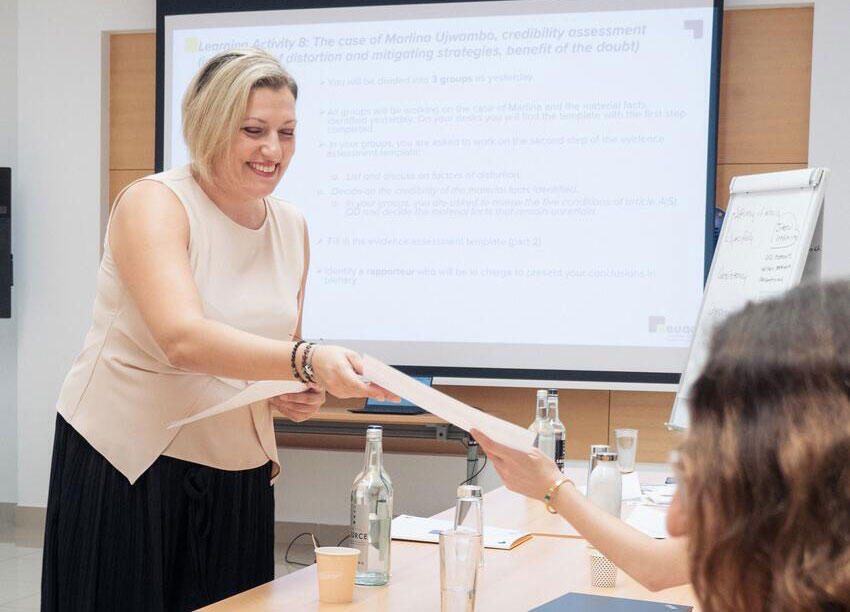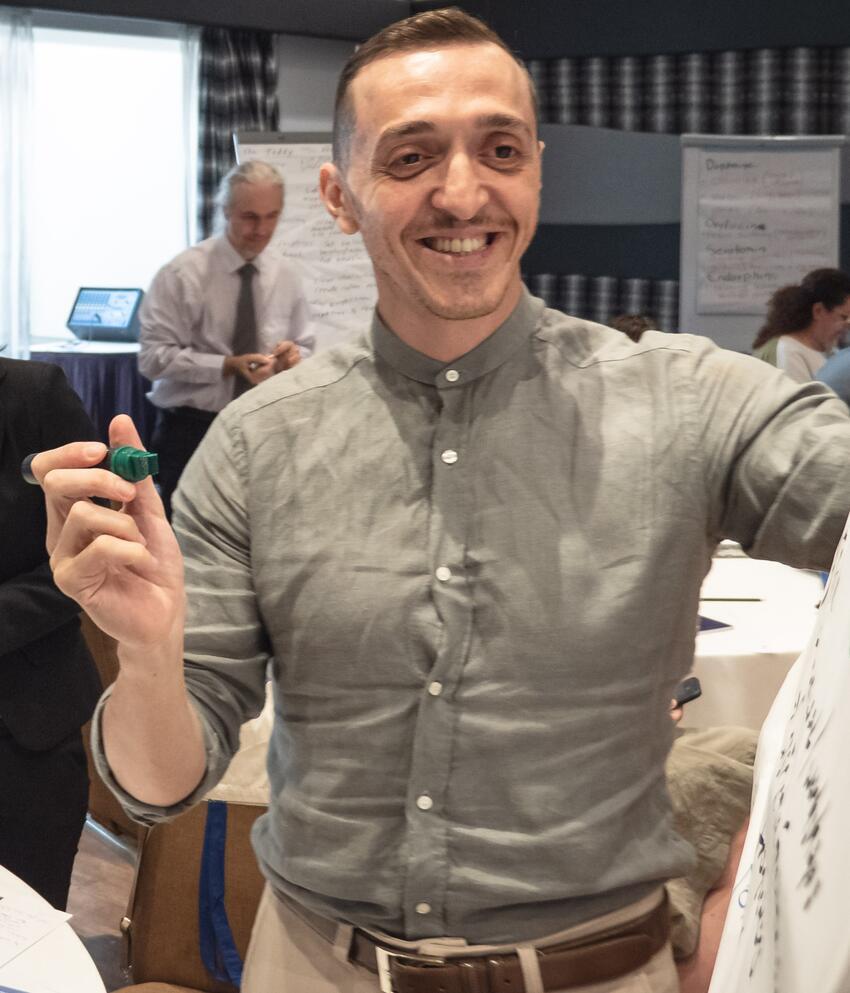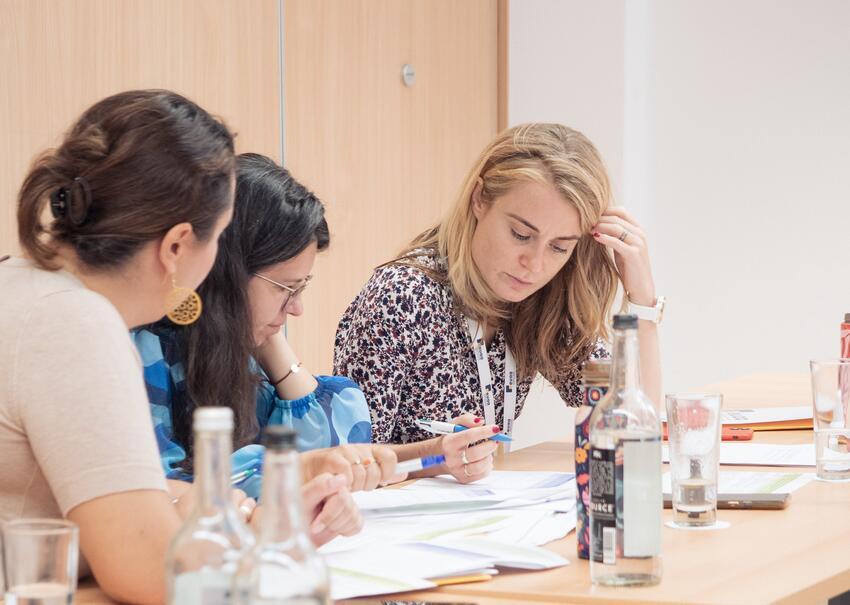> Overview
See key facts and figures on EUAA training in 2022 as well as a focus on the response to the war in Ukraine.
> Training Activities
Here you can find more details about training activities carried out during the year.
> Observations&Trends
This section presents findings about delivery trends and learner feedback.
> EAC
Here you can find key figures and details about the European Asylum Curriculum modules.
Training in the context of permanent support

All Member States are bound by a framework of agreed rules which establish common procedures for international protection to ensure fair and humane treatment of applicants. The main objective of EUAA training activities is to harmonise practice in line with this Common European Asylum System (CEAS). As an integral part of the CEAS, the EUAA is mandated to develop the European Asylum Curriculum, which should be implemented in its core parts by Member States and used to complement national training programmes. The Agency supports EU+ to set up and deliver national training sessions using curriculum modules by training national trainers. Below you will find details of training delivered as part of permanent support in 2022. Use the filters to find out where the training was delivered and the number of participations.
Focus on national sessions delivered in the Netherlands
Throughout the year, the Netherlands organised a high number of national training sessions with 480 individuals trained. The total number of participations under permanent support reached 777, which shows that many individuals attended several training sessions. They delivered the highest number of training sessions for the core modules: Inclusion, Evidence Assessment and Asylum Interview Method/Interview Techniques. There was also a strong focus on vulnerability. Sessions were delivered on Interviewing Vulnerable Persons, Interviewing Children, Trafficking in Human Beings and Gender, Gender Identity and Sexual Orientation. Other modules delivered include Resettlement and Medical Country of Origin Information. Individuals also participated in training on Temporary Protection: Understanding the current framework in the context of the war in Ukraine.
Training newly recruited caseworkers
The Training National Contact Point (TNCP) for the Netherlands asylum authority explains the rationale behind the choice of modules delivered.
“In 2022, we recruited new caseworkers and, as a result, organised a number of national training sessions using EUAA modules. These included the core modules (Inclusion, Evidence Assessment and Asylum Interview Method) which provide the necessary knowledge and skills for a newly recruited caseworker to process asylum claims. This initial training was complemented by sessions on Interviewing Vulnerable Persons and Interviewing Children to provide a better understanding of the special needs of vulnerable applicants"
Ingeborg Vorstenbosch - TNCP
Testimonials
"I found it to be a very educational training and I believe that every asylum caseworker should have this training."
Newly recruited caseworker
“I found it to be a very instructive and useful training. In our work, as asylum caseworkers, we all come into contact with vulnerable people and it is important to know how to properly interview this group. I think it is important that all asylum employees attend this training”.
Participant - Interviewing Vulnerable Persons
"Fun, interesting and, above all, instructive training. Enough space to ask everything and to give your own input! Very meaningful".
Participant - Evidence Assessment
"Good preparation for difficult situations that you may encounter while conducting an interview. Also, it was nice to first focus on theory for a day, which was very interactive, and then practice with work-related cases".
Participant - Asylum Interview Method

Training in the context of operational support
Focus on training under the Spanish Operating Plan
The training activities under the EUAA Operating Plan signed with the Ministry of Inclusion, Social Security and Migrations in Spain continued to progress throughout 2022. Such positive training results were achieved with the active cooperation of all the main stakeholders of the Spanish reception system, namely SEM, Red Cross, UNHCR as well as national NGOs, focusing on the following actions:
- Coordinated training needs assessment and continuous monitoring of training activities - through regular quarterly meetings, involving all stakeholders working in reception both in the Canary Islands and the peninsula
- Development of a joint training plan with the Secretary of State of Migration and the NGOs training focal points - aiming to address main training priorities as well as emerging needs, such as the implementation of the Temporary Protection Directive.
- Designing targeted training itineraries for different reception profiles - training was structured around the learning needs of the main reception profiles, namely: reception managers; technical reception staff (reception officers, social workers, psychologists, social educators, etc.); service providers (security officers, cleaning staff, catering, maintenance) and interpreters
- Increasing the attendance of national authorities and NGO personnel in EUAA train-the-trainers’ sessions to support the development of the national pool of trainers - with 46 reception officers being trained as national trainers.
- Building on the good practices and the collaborative approach established during previous year, EUAA reception-related training will continue in 2023 with the purpose of strengthening the reception capacity and enhancing the system as whole
About the learners
A total of 1 479 participations were recorded for reception professionals who completed EUAA trainings in 2022, with the average satisfaction rate from the training sessions reaching 95%.
Out of the 1 028 individuals trained, 44% of trainees work for the Secretary of State of Migration, while about 50% are NGOs staff, with the majority of them being first line reception officers working directly with asylum seekers in reception centres.
Trafficking in Human Beings - Building awareness through training sessions for service providers
"I loved the experience of this course because I have never taken part in one like this before. I have been working in this sector for 20 months and didn't know anything about this topic. It was very useful to me to understand concepts and learn more about it. In my time working here, I have worked with young people who have lived through these type of events and I didn't know what to do. I feel for them. I put myself in their place and I would like to help them. They are good people with kind hearts, and I would like them to have a good future. This course has helped me to understand their situation. Now I know what I can do to help. I know what I can say to them, I know who to tell. Together, we can join efforts to stop this situation and try to help people who have lived through terrible events and help them escape this situation "
Alby, cleaner in Reception Centre 50, Canary Islands
Training for Asylum Support Teams
"It was very helpful especially for pre-deployment to get a general overview and understanding of the operational context of EUAA."
Learners' feedback
Training in non-EU+ countries
Focus on training in the Western Balkans
The overall objective of the Roadmaps agreed between the EUAA and Western Balkan countries (Albania, Bosnia Herzegovina, Kosovo, North Macedonia, Montenegro) is to enhance the protection space for asylum seekers and refugees by strengthening the asylum and reception system in line with the CEAS, EU standards and EU Member States’ practices. The Western Balkans are beneficiaries of the Instrument for pre-accession assistance. This funding supports them to adopt and implement the political, institutional, legal, administrative, social, and economic reforms necessary to comply with Union values. The reforms are aimed at progressively aligning to Union rules, standards, policies and practices with a view to Union membership. Training is a key tool in supporting this alignment.
Many of the participants from Albania, Bosnia Herzegovina, Kosovo, North Macedonia and Montenegro were building on the training they completed in 2021 – Interview Techniques. It was an opportunity to follow up on how they had been able to put their skills into practice and remind them of techniques that could be applied when interviewing vulnerable persons.
"The training sessions were very valuable for those of us who work with asylum seekers on a daily basis. The materials were very useful and trainers were excellent. What we appreciated the most was the cooperative and collaborative approach which enables us to interact with both the trainers and the other participants in exchanging our experiences of real situations we encounter in our work".
Learners' feedback
Testimonials from session on Interviewing Vulnerable Persons
Face-to-face session held in Budva, Montenegro - 25-26 October, 2022
“My role was two-fold. During the online studies, I had been following my group of learners but also coaching the national trainers from Albania, North Macedonia and Bosnia Herzegovina as they had only recently become national trainers. I also met with them to help them to prepare prior to the face-to-face session. In my group, I was the only trainer, but I was assisted by an Albanian interpreter.
The face-to-face session provided an environment to put into practice the theory learnt during the online studies through discussions, roleplays and group work. Having participants from different areas of the field come together allowed them to share experiences and learn from each other, which is seldom possible in their daily working environment. Apart from the exchange of practices and their application, participants were also able to discuss the challenges they faced when dealing with particularly vulnerable persons. This enriched discussions but also reassured participants that challenges are commonly shared and through community of practice new approaches may be acquired. Overall, the session yielded many positive results.”
Luca Caramagna, EUAA Trainer



